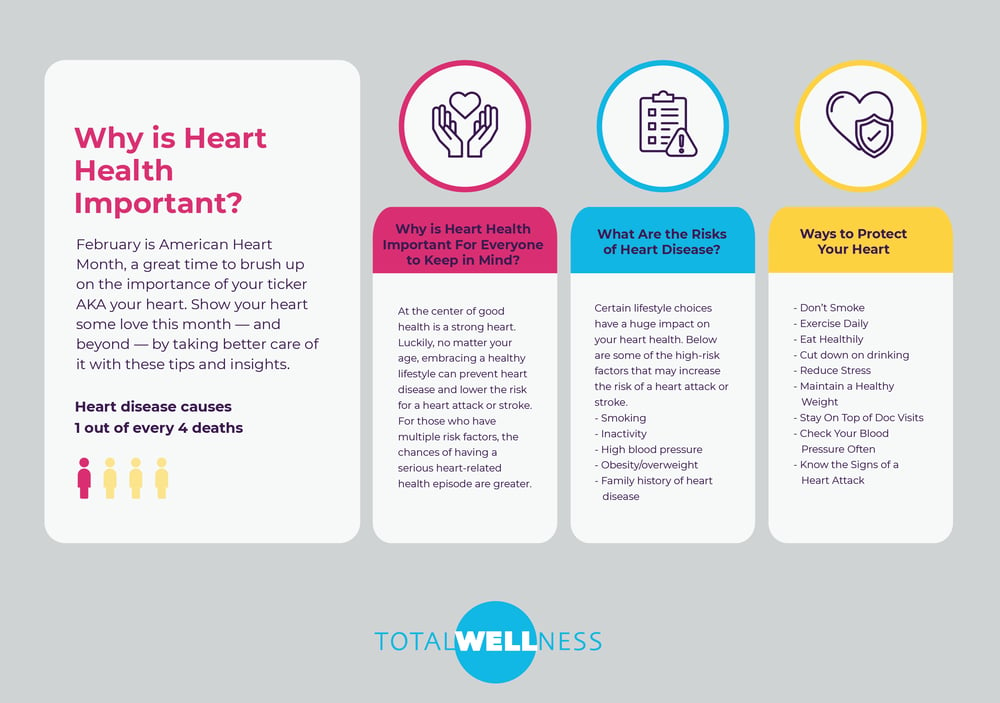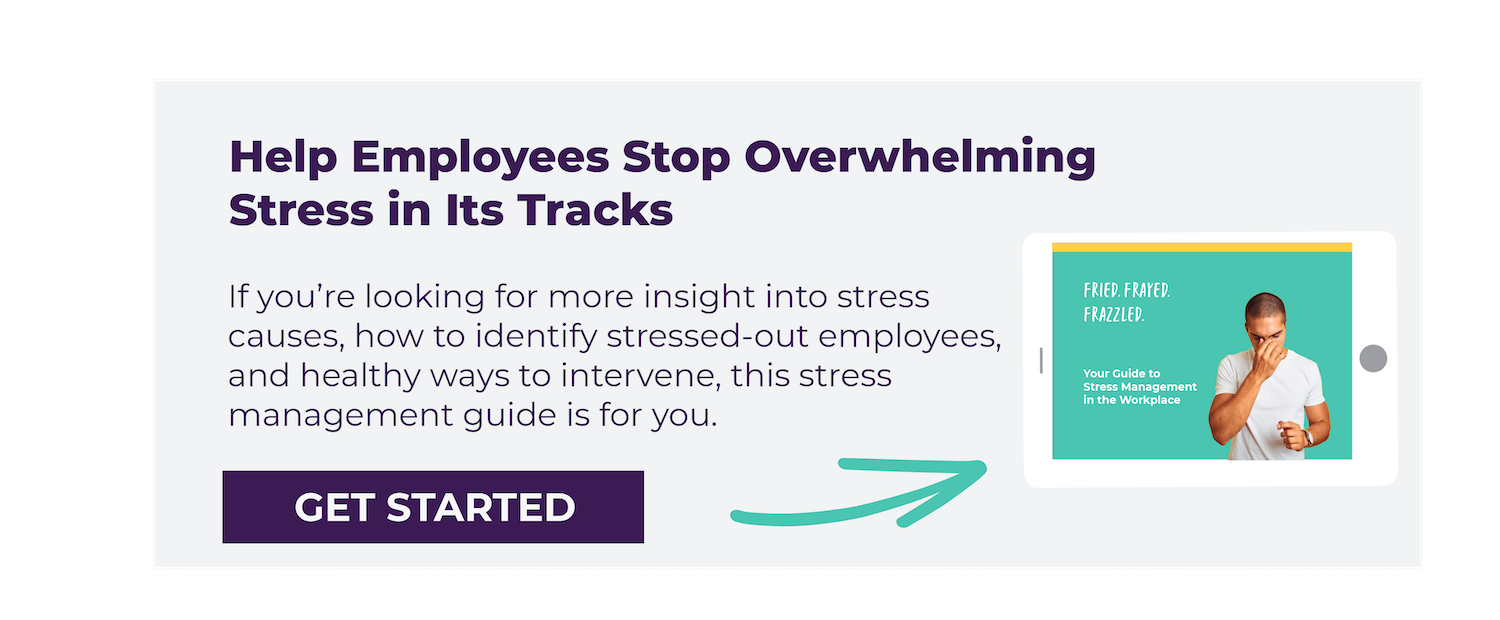 In need of a health topic for February?
In need of a health topic for February?
Now is the prime time to discuss the question, “Why is heart health important?” As we go into the month focused on love thanks to Valentine’s Day, it’s time to show a little love to American Heart Month, which is celebrated in February, too.
Every 36 seconds in the U.S., someone dies from cardiovascular disease (CVD), according to the 2021 Heart Disease and Stroke Report by the American Heart Association. Heart disease is also the number one cause of death in the United States.
For employers, it’s a great time to remind remote workers and office workers who sit all day the importance of practicing heart-healthy activities. Starting good habits now can make all the difference for cardiac health.
Below, we take a look at the importance of heart health and the known risk factors that can cause serious cardiovascular events that could impact your employee’s life in an instant.
Why Is Heart Health Important?
At the center of good health is a strong heart. Luckily, no matter your age, embracing a healthy lifestyle can prevent heart disease and lower the risk for a heart attack or stroke.
For those who have multiple risk factors, the chances of having a serious heart-related health episode are greater.
High-risk factors for heart disease include:
- Smoking
- Inactivity
- High blood pressure
- Obesity/overweight
- High cholesterol levels
- Family history of heart disease (especially a parent or sibling)
Despite that long list of risk factors, making smart lifestyle choices is in your hands. Even with a family history of heart disease, prevention can make all the difference in decreasing cardiac events or even heart failure.
Workplace Best Practices to Encourage Good Heart Health
Employers have a responsibility to consider all facets of employee health. Heart disease is the number one killer in the United States, so making cardiovascular topics a key element of your wellness programs is a smart move.
The cost of poor heart health can’t be ignored, either: Premature death, heart disease, stroke, and their risk factors are expensive health conditions. In fact, it costs nearly $555 billion each year in medical expenses and lost productivity as cardiovascular disease (CVD) is the most costly disease in the United States, according to the CDC Workplace Health Resource Center.
Keep on top of heart health topics by providing valuable resources, tools, and conversations to help remind employees it’s not a health issue to be ignored.
Best practices to consider for employees to stay heart-healthy:
- Put up signs to encourage walking - Yep, be the employer who puts the signs by the elevators that encourage taking the stairs. Those steps all add up and stairs are an excellent way to get in cardio.
- Offer blood pressure monitors - If you can swing one for each employee, great! Or, consider putting one in the break room or in the workplace gym so employees can monitor their blood pressure.
- Set up biometric screenings - Biometric screenings are a series of health tests that show employees where their health is. This includes important tests that indicate heart health like blood pressure and cholesterol checks.
- Mandate healthy vending options - There are options available for vending machines that are healthier. Think jerky, unsalted nuts, dried fruits, sparkling waters, and the like. Consult with the company vendor to see what healthier options are available.
Employees who have good cardiovascular health tend to be healthier overall. That means they’re more energized and productive, too. By encouraging heart-healthy activities and lifestyle actions, you set the tone for a better and healthier workplace.
Related: American Heart Month: Healthy Heart Advice from a Cardiologist
Smart Ways to Improve Heart Health Starting Today
Despite cardiovascular disease being the number one cause of death in the U.S., the steps you take today can prevent you from becoming a statistic. With education and discipline, it takes some slight adjustment to make those smarter lifestyle choices, but it can be done!
Here are ways to stay on top of your heart health:
Get a Hold of Your Medical Conditions Now
One way to prevent a deadly heart attack or stroke is to review your current medical conditions with your physician. Doing so can alert you to the most pressing concerns that may lead to complicated heart issues or even death. This includes watching and lowering high cholesterol, high blood pressure, or controlling diabetes to lower heart disease risk.
Ways to take control of your health issues:
- Control your blood pressure - It’s good to know what your “normal range” is and to take your blood pressure often.
- Check your cholesterol - Every four to six years, your cholesterol levels should be checked by someone on your healthcare team. This is done through blood work. If you have a family history of high cholesterol or your past blood work indicated it, you may go in for more frequent checks.
- Take meds as directed - Medicine can’t help you if it’s not taken as directed by your medical team. This is especially important for high blood pressure, diabetes, and heart medication.
- Check blood sugar levels - As a diabetic, it’s important to keep on top of your blood sugar level checks even if you feel fine. Doing so can keep you ahead of a major health event that could land you in the hospital and/or jeopardize your heart.
Choose Healthy Foods
This includes drinks, too. It’s easy to have one or two sodas and quickly go over your sodium and sugar limits for the day. Opt for flavored or sparkling waters instead to stay hydrated and reduce your calorie intake.
Exercise
Regular physical activity is a must for all ages. Whether that includes walking, biking, swimming, yoga, kickboxing, or another form of activity. In an era of sitting more at work (hello, remote work!), being sedentary is often a part of the American lifestyle.
Physical activity can help you:
- Reduce stress
- Keep a healthy weight
- Lower your blood pressure
- Reduce blood cholesterol
- Stabilize and keep blood sugar levels normal
Move your body to get blood flowing and your heart pumping. It will keep more than your heart healthy, too. It will keep joints from getting too stiff, reduce weight gain, improve brain function, and much more.
Questions to Ask the Doc at Your Next Visit
At your next check-up, make a note to ask about heart health and your risk for a cardiac event. Many doctors have access to a risk calculator and based on your previous bloodwork and other factors can calculate your heart disease risk.
Some questions to spark the conversation:
- Can I inherit heart disease?
- What are some heart-healthy foods to eat?
- What resources can help me to stop smoking?
- At what age do I need to take my heart health seriously?
- What is the best indicator of heart disease?
- What is the best way to assess my heart health?
This is a great way to start a personal conversation about how to improve heart health because it gives you solid data to start your journey to better heart health.
Know the Signs of Heart Distress
A heart attack is a scary event — not just for the person suffering from it, but also for those around them. Employers and their leadership teams who know what to look for can get help sooner for someone having a heart attack which often means a better prognosis.
Important to note: Many heart attacks start slowly with discomfort or mild pain. But some can be sudden and intense.
Your employees should tell leadership to call 911 if they experience:
- Chest discomfort - This usually starts in the center of the chest and lasts beyond a few minutes. It may also go away and come back. It can feel like fullness, squeezing, uncomfortable pressure, or even pain.
- Upper body discomfort - This includes a range of symptoms from pain or discomfort in one or both arms, the jaw, neck, stomach, or back.
- Shortness of breath - This may happen with or without chest pains.
Men and women often experience different symptoms when having a heart attack. Most women notice chest pain (angina) or discomfort. Other symptoms women may experience include back or jaw pain, nausea, vomiting, and often shortness of breath.
Resources to Use During American Heart Month
During February, put some heart into your American Heart Month awareness campaign. Share valuable resources and open the conversation about heart health.
Want some more resources to share with employees? Check these out:
- American Heart Association
- National Heart, Lung and Blood Institute
- The Heart Truth for Women Campaign
- Heart Disease and Stroke Statistics— 2021 Update: A Report From the American Heart Association
Since early action is critical for heart attack victims, it’s also important for employers to know the warning signs. By getting help faster, it increases the chances of survival when emergency treatment is given sooner. By sharing details like warning signs and symptoms and prevention measures, you’ll give your employees essential knowledge that could one day save their life.
How do you plan to promote American Heart Month activities in your office? Share your ideas below!



